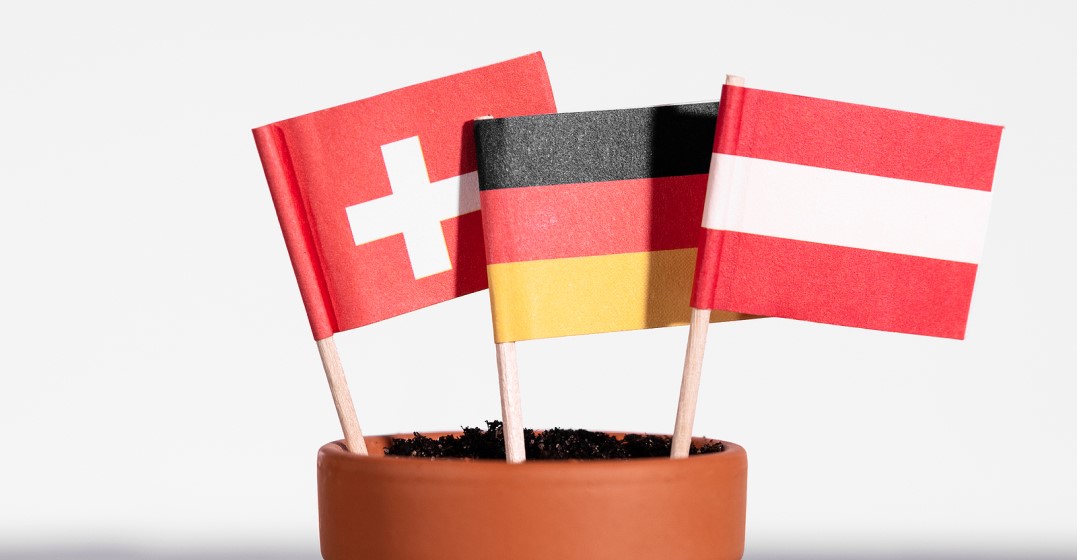by Lingoda Team
Updated on June 15, 2023
When discussing the German language, it can sometimes be tempting to think of it purely in terms of its use within Germany, which is by far the largest German-speaking country in the world. However, it is important to remember that, like with any language, there are different variations and dialects to be aware of.
It is estimated that around 105 million people around the world speak German as native speakers, while an additional 80 million people speak it as a second language. Approximately 8 million native German speakers live in Austria, while German also has official status and is widely spoken in Switzerland as well.
Although German speakers in both countries will have no problem understanding somebody speaking standard German to a decent extent, it is essential to recognise that the German spoken in Austria and Switzerland differs in many aspects as well. Here, we take a closer look at some of the key vocabulary differences of Swiss German vs Austrian German and standard German.
The variation of German spoken in Austria is known as Austrian German, or Österreichisches Deutsch. Despite their differences, Austrian German and standard German are generally considered to be mutually intelligible, meaning a German will usually understand German from Austria, and vice versa.
Austrian German dates back to the 18th century and is a source of pride for people living in the country, many of whom like to use Austrian phrases and expressions, rather than standard German equivalents. Below, we list some Austrian German words and phrases, along with their standard German counterparts and English translation.
Austrian German: Erdapfel
Standard German: Kartoffel
Translation: Potato
Austrian German: Paradeiser
Standard German: Tomate
Translation: Tomato
Austrian German: Faschiertes
Standard German: Hackfleisch
Translation: Ground beef
Austrian German: Jänner
Standard German: Januar
Translation: January
Austrian German: Sackerl
Standard German: Tüte
Translation: Bag
Austrian German: Obers
Standard German: Schlagsahne
Translation: Whipped cream
Austrian German: Heuer
Standard German: Dieses Jahr
Translation: This year
Austrian German: Marillen
Standard German: Aprikosen
Translation: Apricots
Austrian German: Rauchfang
Standard German: Schornstein
Translation: Chimney
Austrian German: Stiege
Standard German: Treppe
Translation: Stairs
While all of the above words will be understood by Austrian German speakers, it is worth noting that many of the standard German expressions are used as well. For instance, while the word ‘Erdapfel’ is the accepted Austrian German term for ‘potato’, more than half of the Austrian population use the standard German ‘Kartoffel’.
The various German dialects spoken in Switzerland fall under the catch-all term Swiss German, or Schweizerdeutsch. It is important to understand that German from Switzerland is not uniformed and incorporates dozens of individual dialects. Nevertheless, these dialects do share similarities, allowing them to be broadly grouped together.
In terms of vocabulary, one noticeable element of Swiss German vs German is the borrowing of English words for technological innovations. While a new word is often coined for new technology in standard German, Swiss speakers often use a variation of the English word, albeit with significantly different pronunciation. Moreover, it’s worth noting the influence of French, another of the official languages in Switzerland.
Swiss German: Zmorge
Standard German: Frühstück
Translation: Breakfast
Swiss German: Trottoir
Standard German: Gehsteig
Translation: Pavement/sidewalk
Swiss German: Rechner
Standard German: Taschenrechner
Translation: Calculator
Swiss German: Coiffeur
Standard German: Frisör
Translation: Hairdresser
Swiss German: Anken
Standard German: Butter
Translation: Butter
Swiss German: Velo
Standard German: Fahrrad
Translation: Bicycle
Swiss German: Härzig
Standard German: Niedlich
Translation: Cute
Swiss German: Dehei
Standard German: Zu hause
Translation: At home
Much like with Austrian German, Swiss German words are not always used, and sometimes standard German words and phrases will be used instead. In general, there is a city/rural divide, with cities having lost much of the Swiss vocabulary over time. Nevertheless, some standard German words, like Frühstück, are almost never used.
